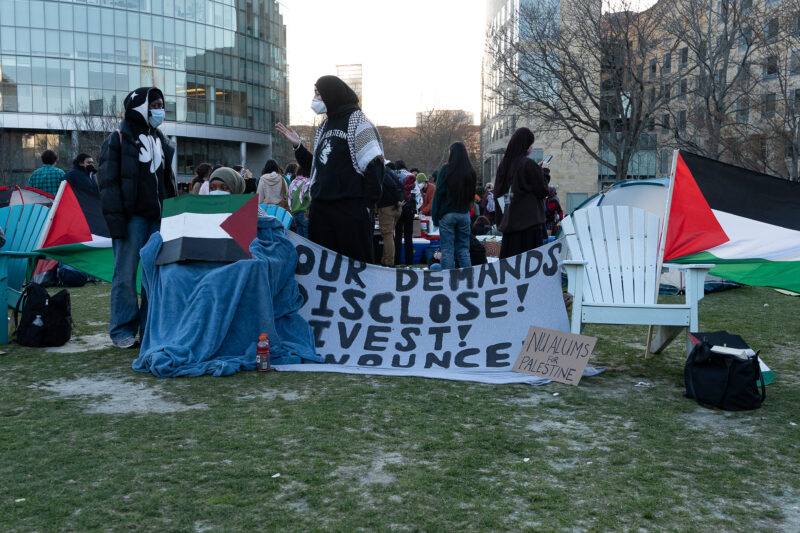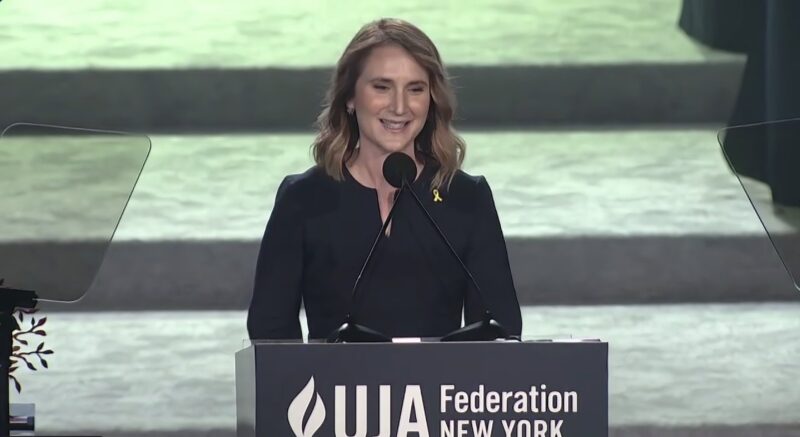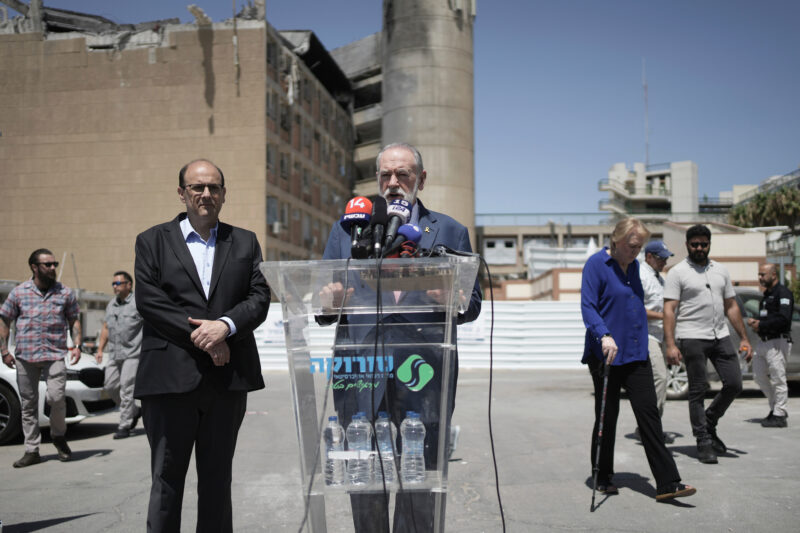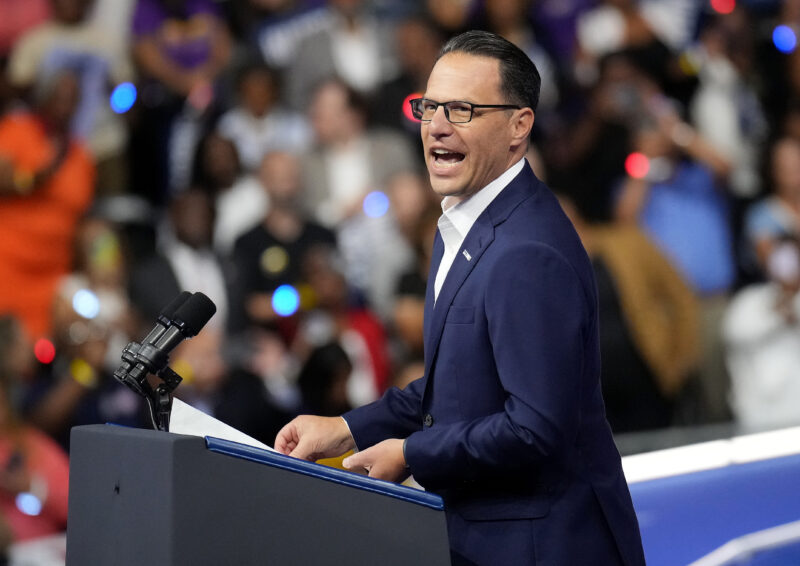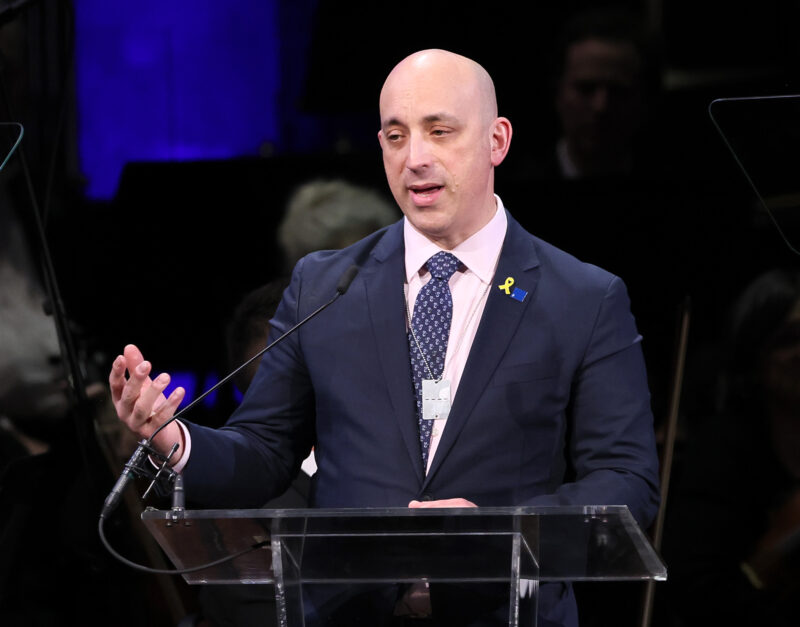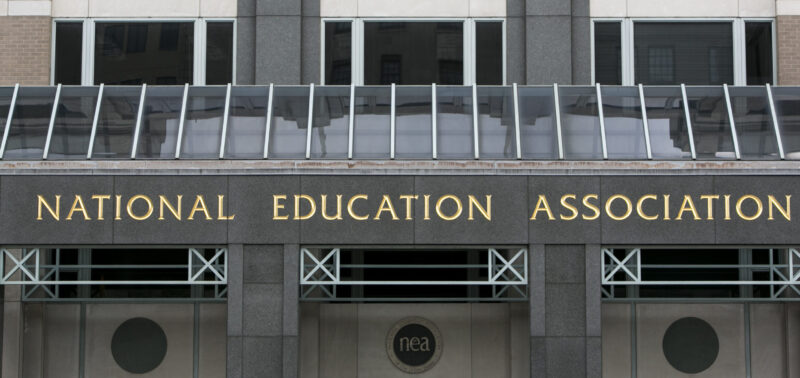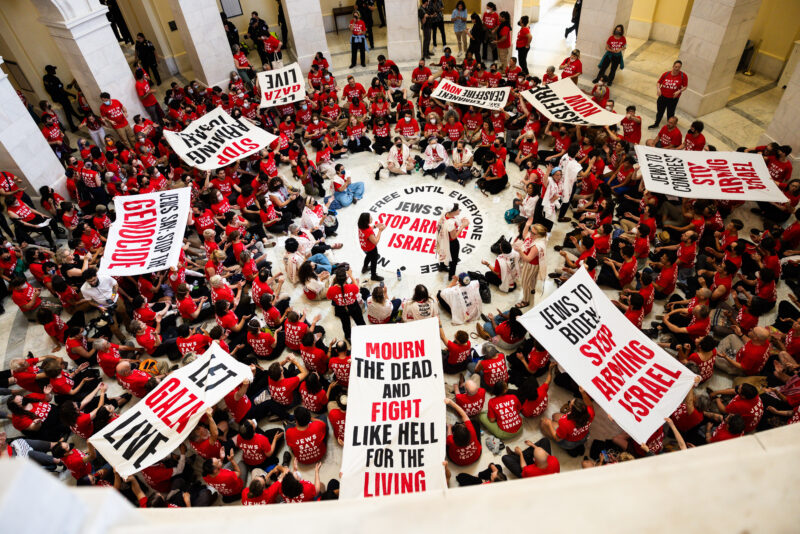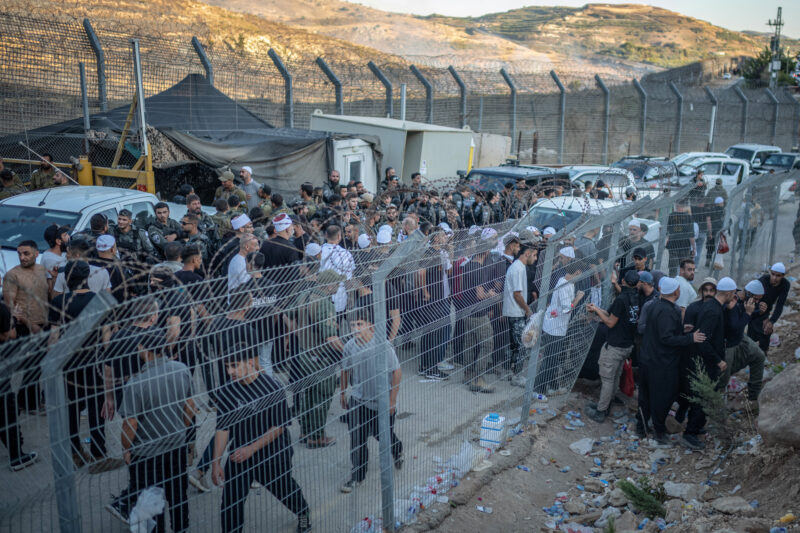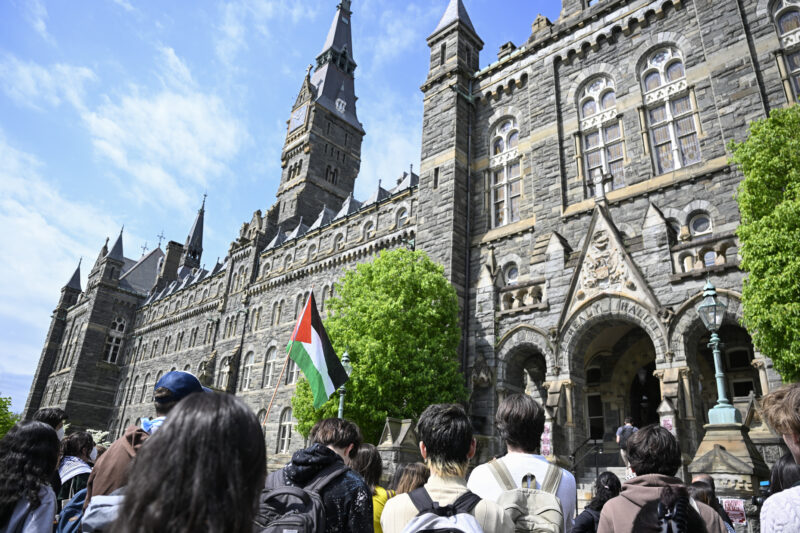United Torah Judaism left the coalition and Shas quit the government, but did not pull its 11 lawmakers out of the parliamentary coalition
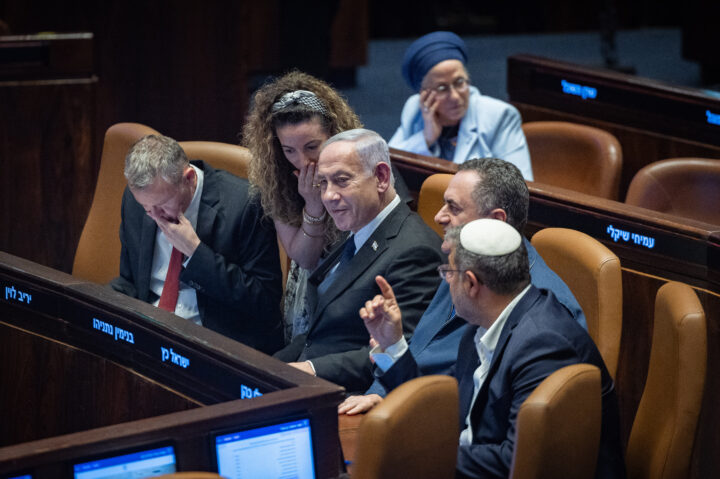
Yonatan Sindel/Flash90
A discussion and a vote on the expulsion of MK Ayman Odeh at the assembly hall of the Knesset, the Israeli parliament in Jerusalem, July 14, 2025.
New Israeli elections are unlikely to happen this year, despite the departure on Wednesday of two parties from Israeli Prime Minister Benjamin Netanyahu’s government over disagreements over Haredi military exemption legislation.
After months of disagreements, Ashkenazi Haredi faction United Torah Judaism left Netanyahu’s coalition in protest, leaving it with 61 out of the Knesset’s 120 seats. On Wednesday, Sephardic Haredi party Shas’ five Cabinet ministers quit the government, though party leader Aryeh Deri will remain an observer in the Security Cabinet.
Shas only quit the government — meaning their Cabinet posts — and did not pull its 11 lawmakers out of the parliamentary coalition. Shas, whose voter base is right-wing and even more supportive of Netanyahu than the prime minister’s own Likud party, said it will not vote with the opposition. This means that Netanyahu retains a majority in the Knesset, albeit a razor-thin one.
Opposition leader Yair Lapid still argued soon after Shas’ announcement that “starting today, Israel has a minority government. A minority government cannot send soldiers into battle … It has no authority, no right. It is an illegitimate government.”
“Israel does not have full-time welfare, health, interior, housing or labor ministers,” Lapid added. “The Netanyahu government is a minority government that endangers the care of Israel’s citizens.”
Both Haredi parties have been boycotting Knesset votes since April in protest over the Haredi conscription debate, in effect leaving the coalition with a minority and obstructing its ability to pass laws.
Israeli law only allows an early election to be called proactively, meaning that a Knesset member would have to propose a bill to disperse the legislature, followed by three separate votes on the issue. Opposition leaders held a vote last month on dispersing the Knesset, and under Israeli law are prevented from calling another such vote for six months unless 61 lawmakers sign a petition to the Knesset speaker.
Netanyahu’s government has time on its side, with the Knesset’s summer recess beginning on July 27 and the legislature’s voting schedule recommencing on October 19.
By law, the next election is set for Oct. 27, 2026, but the last time a Knesset election was held on its originally scheduled date was in 1988.
Shas and UTJ left the government over the ongoing political debate over legislation that would impose penalties on Haredi yeshiva students who do not enlist in the IDF. The parties’ Councils of Torah Sages have argued that religious study must be prioritized over serving in the military.
Israel has a mandatory military draft, but has historically exempted Arab citizens and Haredi yeshiva students from conscription. Governments on the left and right maintained the exemption for Haredim over decades, but Israel’s High Court of Justice struck it down in a series of rulings over more than 10 years, with no minor adjustments made by consecutive governments satisfying the justices’ standard of equality under the law. Last summer, the court ordered the Defense Ministry to send draft notices to young Haredi men.
Meanwhile, the 21 months of war in Gaza — with hundreds of thousands of Israelis serving in reserves, many of whom have served hundreds of days in active duty, leaving behind families and businesses — have increased the IDF’s manpower needs and the urgency to resolve the issue of Haredi conscription. Shas and UTJ’s allies on the Israeli right have moved away, in varying degrees, from tolerating the exemption for political expedience even as their own constituents serve in the IDF.
Knesset Foreign Affairs and Defense Committee chairman Yuli Edelstein, a Likud lawmaker, has been at the forefront of the dispute with the Haredi parties, refusing to advance legislation that does not satisfy the military’s needs, while Shas and UTJ demand that the bill institute little to no consequences for yeshiva students who do not serve in the IDF.
When announcing his resignation from the cabinet on Wednesday, Religious Services Minister Michael Malkieli said that penalizing yeshiva students for not serving is “no less than cruel and criminal persecution.”
Among the proposed sanctions are cutting daycare and housing subsidies afforded to the Haredi sector, prohibiting those who ignore conscription notices from receiving driver’s licenses or leaving the country, and, in some cases, arrest.
Edelstein reached a compromise over the sanctions with the Haredi parties in June, less than a day before the 12-day war with Iran began. However, the Haredim continued to boycott coalition votes in recent weeks, leading Edelstein to withdraw some of his concessions.
Speaking at a conference on Wednesday, Edelstein said that “this is not the time to bring down a right-wing government.”
He called on the Haredim to “bring a concrete proposal. For once, the Haredim should say what they agree to. My door is open; I promise to examine it quickly and hold negotiations.”
“For an entire year, they did not bring any concrete proposal for a conscription law,” Edelstein added. “In the moment of truth, they … made all kinds of excuses every time … It’s apparently not a question of the extent of the sanctions or the target [enlistment] numbers, but a total refusal to take part in the holy privilege … that is called the Israeli Defense Forces.”
Edelstein agreed to postpone some penalties on yeshiva students who avoid the IDF draft

MENAHEM KAHANA/AFP via Getty Images
Israel's Prime Minister Benjamin Netanyahu addresses the assembly during a session of the Israeli parliament (Knesset) at its headquarters in Jerusalem on June 11, 2025.
The Knesset on Thursday struck down a bill that would have called an election later this year, with Haredi parties agreeing to another week of negotiations on penalties for yeshiva students who avoid the IDF draft.
The bill to disperse the Knesset was voted down 53-61 at about 3 a.m., and as a consequence, opposition parties will not be able to propose similar legislation for six months. The Haredi parties, however, could still submit a bill to call an early election should negotiations not go their way.
Knesset Foreign Affairs and Defense Committee Chairman Yuli Edelstein was optimistic that the sides would come to an agreement, announcing shortly before the vote that “agreements about the principles on which the conscription bill will be based,” had been reached.
“Only a real, effective bill that will expand the IDF’s basis of enlistment will come out of a committee that I lead,” Edelstein added. “We are on the way to a real repair of Israeli society and the security of the State of Israel.”
Haredi parties Shas and United Torah Judaism had threatened to bring down the government over legislation regarding the draft of yeshiva students into the IDF.
The High Court of Justice ordered the government last year to actively conscript Haredi yeshiva students after they were exempted for decades. Leading Haredi rabbis have said they oppose any young men from their communities enlisting in the IDF, even if they are not learning Torah full time.
The bill in question sets rising target numbers for Haredi conscription, reaching 50% in five years. The dispute between Edelstein and Haredi parties centered around the penalties for Haredi men aged 18-26 who do not report to the IDF after receiving draft notices.
Edelstein reportedly agreed to delay some of the sanctions on yeshiva students who do not enlist. The new version of the bill will include immediate bans on receiving drivers licenses and leaving the country and canceling affirmative action for government jobs and subsidies for college degrees for those who do not report for IDF service. However, the discount on daycare tuition will remain in place for six months after a missed draft date, and welfare payments will continue for a year. Housing subsidies would not be canceled for two years after avoiding the draft.
Yeshivas with students that avoid conscription will lose government subsidies; if 75% of the annual draft target is not met, the government will stop subsidizing all Haredi yeshivas.
Israeli Opposition Leader Yair Lapid accused Israeli Prime Minister Benjamin Netanyahu of “spitting in the faces of IDF fighters. Once again you sold out our combat soldiers — for what? For two more weeks? Three more? … The government allowed [the Haredim] to ignore the reservists and help them [ensure] draft avoidance for tens of thousands of healthy young people.”





